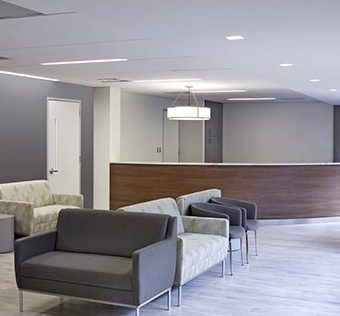Endometriosis is a GYN condition that happens when tissue from the lining of the uterus—the endometrial lining—grows outside of the uterus to other organs in the pelvis and abdomen.
Back to TopPain during and around the cycle is the number one complaint from patients with endometriosis, ranging from mild to incapacitating, making normal activities impossible.
Other symptoms include:
Less common symptoms include:
Infertility is a very common result of Endometriosis and can be present in most patients with the disease.
Back to TopThere are three primary types of endometriosis that all start with growth on the peritoneal lining, and then “invade” or penetrate deeper into the lining with time.
Superficial Peritoneal Lesions:
These are thin, flat lesions that do not grow extensively into the lining and deeper. While these lesions are typically associated with mild cases of endometriosis, they can still be responsible for severe pain.
Ovarian Endometriomas (also known as Chocolate Cysts):
Endometriomas are cysts that are commonly found on the ovaries and are sometimes filled with brown fluid (chocolate cysts). Ovarian endometriomas are usually associated with more severe stages of endometriosis.
Deep Infiltrating Endometriosis (DIE):
These lesions penetrate deep into the surface of the peritoneum, often causing severe pain. The presence of multiple deep implants indicates a later stage of endometriosis.
While researchers are not sure what definitely causes endometriosis, they have identified several possible causes, including:
Endometriosis is a “surgically staged” disease, meaning that only surgery can determine the “extent” of the disease.
Stage 1:
Classified as minimal. In this stage, there are few superficial implants and no significant adhesions or scar tissue. It is still possible to have severe symptoms in this stage despite the light spread of the disease.
Stage 2:
Classified as mild. In this stage, there can be both superficial and deeper implants—but still without any significant adhesions.
Stage 3:
Classified as moderate. In this stage, there are multiple deep implants, small cysts on one or both ovaries and filmy adhesions. Adhesions are made up of scar tissue that causes organs to stick together. Adhesions can cause pain and nausea in some cases.
Stage 4:
Classified as severe. In this stage, there are multiple implants, large cysts on one or both ovaries and dense adhesions. Patients in this stage are at the highest risk of infertility and other complications, so treatment should be considered urgent.
Note that a stage does not mean more pain. For example, patients with stage 4 endometriosis may experience little or no symptoms, while patients with stage 1 endometriosis may be in severe pain.
Back to TopThe best way to properly diagnose and treat endometriosis is by working with a HyperSpecialist.
CIGC Hyper-Specialists are not OBGYNs. Instead, they are GYN Oncology trained specialists who use the powerful DualportGYN RetroPeritoneal Excision method for the surgical removal of endometriosis. The techniques and procedures used by CIGC provide the highest quality of care at the lowest possible cost.
Outcomes have shown the fastest endometriosis excision recovery and lowest complications.
Back to TopMeet with a CIGC specialist for a consultation to diagnose your condition.
Work with your CIGC specialist to plan your treatment and schedule your DualportGYN technique.
Undergo minimally invasive surgery that effectively removes the GYN issue and leads to faster recovery.
Back to TopHow fast is Endometriosis Excision recovery with CIGC?
All patients undergoing excision of endometriosis, from those with minimal disease to those with extensive disease or requiring a hysterectomy, will go home the same day as surgery.
Endometriosis excision recovery times usually range between three to five days, with up to seven to ten days required for more extensive surgery. In all cases, patients are able to walk the first day and are mobilizing easily on the second day.
Why is it essential that my endometriosis is removed by a specialist?
Although endometriosis is a relatively common condition, it is not easily diagnosed or treated. OBGYNs often delay the diagnosis with long-term medical therapy or by not performing excision surgery early in the disease process, allowing the disease to progress and cause increasing pain and infertility.
Access to a Hyper-Specialist, such as those at CIGC, ensures early diagnosis and treatment to control endometriosis in its early stages, which can help to preserve fertility options and control pain.
At CIGC, our focus is on performing the least invasive procedures to treat your condition based on your long-term plans, taking into account your desire for fertility.
Why shouldn’t my OBGYN perform my endometriosis surgery?
Your OBGYN most likely concentrates more on obstetrics than surgery. Most OBGYNs do not have the training or surgical volume to learn and develop the best surgical techniques.
The result is either a delay in care in performing surgery or inadequate removal of all endometriosis implants at the time of surgery.
Surgical specialists, on the other hand, focus solely on surgery and have the additional training and skills required to perform better and safer surgery.
CIGC surgeons are Hyper-Specialists with GYN Oncology training—the highest level of training available for endometriosis.
Back to Top
At CIGC, our Hyper-Specialists are committed to minimally invasive endometriosis excision, perform a higher volume of surgeries, see a broader range of case types, and undergo more comprehensive training. Our surgeons have expertise in advanced techniques and procedures and have learned to perform even the most complex GYN surgeries with low complication rates. The result is better outcomes with improved pain and fertility, all at a much lower cost.
Who We AreIf you’re experiencing symptoms of Endometriosis, trust our Hyper-specialists to evaluate your symptoms and condition and recommend an appropriate solution.
Back to Top
We proudly offer convenient office and surgical locations across the country. Our office locations are open Monday through Friday from 8:00am–4:00pm. Traveling out of state? We offer traveling programs that help you get the surgery you need.
Office LocationsSchedule a consultation to learn more about how we can treat your condition today.